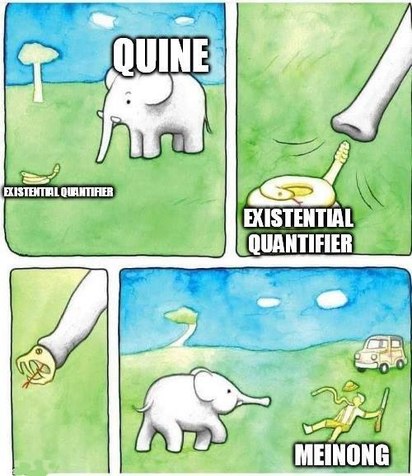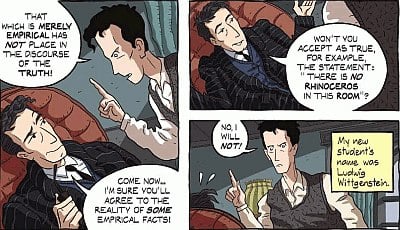-
 Shawn
13.5kI've long been interested in things that inhabit Meinong's Jungle. Things that can inhabit Meinong's Jungle can be unicorns, God, Santa Claus, and Plato with a beard.
Shawn
13.5kI've long been interested in things that inhabit Meinong's Jungle. Things that can inhabit Meinong's Jungle can be unicorns, God, Santa Claus, and Plato with a beard.
So, Meinong's Jungle exists in many cases because we can stipulate the existence of non-beings like a square-circle or Santa Claus. I'm not inclined to agree with Quine here and assert that limiting the scope of existential quantification to entities that are analytically true or empirically valid as something that entirely resolves the issue here. I mean, we can stipulate the existence of counterfactuals such as a person who was me; but, may have been called another name.
So, how is it that we can speak about stuff like Plato having a beard or Santa Claus existing on the North Pole?

-
 Terrapin Station
13.8kSo, how is it that we can speak about stuff like Plato having a beard or Santa Claus existing on the North Pole? — Wallows
Terrapin Station
13.8kSo, how is it that we can speak about stuff like Plato having a beard or Santa Claus existing on the North Pole? — Wallows
I've never understood the issue here. We can imagine things that aren't the case. What's the big mystery?
Philosophy has always seemed to approach fiction like someone with a significant learning disability. -
 Nils Loc
1.5kWe can imagine things that aren't the case — Terrapin Station
Nils Loc
1.5kWe can imagine things that aren't the case — Terrapin Station
What is the case? About what is the case?
What the hell is going on here?
It is probably also self-evident.
Elephants don't use snakes as blow darts. -
 Shawn
13.5k
Shawn
13.5k -
 S
11.7kLike Plato's beard? — Wallows
S
11.7kLike Plato's beard? — Wallows
Since the Greek philosopher did not wear a beard, the phrase came to be identified as the philosophy of understanding something based on what does not exist. — Wikipedia
No one wears a beard. No one ever has. They either have a beard or they don't, and they wear things like a hat or a jumper.
Therefore I win. -
 andrewk
2.1k
andrewk
2.1k
I think "Plato's beard" is what we call a 'play on words' and fits in the same category as the jokeSo, how is it that we can speak about stuff like Plato having a beard or Santa Claus existing on the North Pole? — Wallows
"Q. What's the difference between a duck? A. One of its legs is both the same."
or
"More people have been to Russia than I have".
The joke is that it sounds like it says something, but it doesn't say anything.
On the contrary, "Santa Claus" is about a real thing, which is a story, and refers to a real feature of that story, which is one of its characters. -
 Shawn
13.5kI've never understood the issue here. We can imagine things that aren't the case. What's the big mystery? — Terrapin Station
Shawn
13.5kI've never understood the issue here. We can imagine things that aren't the case. What's the big mystery? — Terrapin Station
On the contrary, "Santa Claus" is about a real thing, which is a story, and refers to a real feature of that story, which is one of its characters. — andrewk
What do you think @Banno? -
 Deleteduserrc
2.8k've never understood the issue here. We can imagine things that aren't the case. What's the big mystery?
Deleteduserrc
2.8k've never understood the issue here. We can imagine things that aren't the case. What's the big mystery?
Philosophy has always seemed to approach fiction like someone with a significant learning disability. — Terrapin Station
As with most philosophical problematics, its the conceptual nitty-gritty of fleshing out how these things work that presents the problems. It's unlikely that the philosophers who engage with these issues are unable to engage felicitously in everyday discussions of fiction-- unable, in such discussions, to distinguish between the fictitious and the real.
It's their capacity to engage with the dense webs of conceptual implication that draw them in, without their having to forfeit their capacity for making everyday distinctions.
But, of course, there's always and ever a temptation to momentarily puff up oneself by parsing such considerations as an index of the other's stupidity. It's an easy way to move through the world - either everything fits into my understanding, or, if it doesn't, it means others are stupid - children do this all the time, and we don't fault them. They've simply reached the limit of their understanding. If it inevitably comes down to 'You're saying something I agree with' or 'you're learning disabled', then there's nothing for it. All you can do is wait for them to be ready to try to move beyond what they already know, and, in the mean time, allow them to wear themselves out yelling 'you're dumb.' -
 Terrapin Station
13.8kAs with most philosophical problematics, its the conceptual nitty-gritty of fleshing out how these things work that presents the problems. — csalisbury
Terrapin Station
13.8kAs with most philosophical problematics, its the conceptual nitty-gritty of fleshing out how these things work that presents the problems. — csalisbury
There's nothing difficult to flesh out about it. The inanity stems from wanting to avoid psychologism, wanting to avoid the subjective realm, wanting to stick with obviously wrong theories of reference, which all stemmed from wanting to make philosophy more "scientific" a la a rather caricatured view of the sciences.
[Para removed by mod] -
 Janus
18k
Janus
18k
There are two distinct alternative possibilities here: in some cases it may indeed be that someone suffers from a lack of understanding and hence cannot see where there is a genuine philosophical problem. In other cases there may be no genuine problem at all, but merely an illusion that feeds on conceptual confusions to sustain its diaphonous existence.
The real problem is: how do we definitely tell in particular cases which of the two alternatives is the operant one? -
 Deleteduserrc
2.8kI agree. But the only way to tell is to take a look at what's being said. I'm not attacking a wittgensteinian approach that disntinguishes between well and ill posed questions. I'm casting judgment on a reflexive 'this is dumb' approach.
Deleteduserrc
2.8kI agree. But the only way to tell is to take a look at what's being said. I'm not attacking a wittgensteinian approach that disntinguishes between well and ill posed questions. I'm casting judgment on a reflexive 'this is dumb' approach.
(I'll duck out now tho. All I wanted to say.) -
 Terrapin Station
13.8k
Terrapin Station
13.8k
I think it's worth casting judgment on the idea that academics can't spend a lot of time and effort on approaching a problem in a fundamentally "dumb" manner, as if they're immune from foibles that plague every other arena of human endeavor. -
 Janus
18k
Janus
18k
Yes, if someone wants to claim that a philosophical problem is really a conceptually generated pseudo-problem, then they they should be able to give a good account of just how and why that situation comes about. Saying things like "There's no problem because I can't see a problem" or "I don't agree with that, it's just dumb" don't cut it at all.
Also, I just thought of a third possibility: that there is no real problem in the final analysis, but someone comes to that right conclusion for the wrong reasons, simply because they have never fallen into thinking there is a problem in the first place, due their lack of philosophical subtlety. -
 Terrapin Station
13.8kI'm willing to talk in PM if you want. — csalisbury
Terrapin Station
13.8kI'm willing to talk in PM if you want. — csalisbury
Seems kind of arbitrary, but okay. -
 MindForged
731Isn't the whole issue that one can say true things about objects that don't exist? If I say "Sherlock Holmes is a clever detective" few will say it's simply a false statement. Given it's truth, on it's face, contradicts that correspondence theory of truth (which is seemingly a fairly straightforward way to understand truth) the issue doesn't seem so easily cleared up with derision about philosophers being silly or what have you.
MindForged
731Isn't the whole issue that one can say true things about objects that don't exist? If I say "Sherlock Holmes is a clever detective" few will say it's simply a false statement. Given it's truth, on it's face, contradicts that correspondence theory of truth (which is seemingly a fairly straightforward way to understand truth) the issue doesn't seem so easily cleared up with derision about philosophers being silly or what have you. -
 Shawn
13.5k
Shawn
13.5k
It's called "logicomix". I can't do a specific Google search for the clip I presented.
Here's some more:
http://existentialcomics.com/philosopher/Ludwig_Wittgenstein -
 Shawn
13.5k
Shawn
13.5k
Well, it seems you boiled down the issue of 'truth' being accessible to only the correspondence theory. Which theory meshes with "saying true things about objects that don't exist"?
Or do we just salvage the correspondence theory by adding in things (empty names) into the scope of the theory? -
 S
11.7kI'm willing to talk in PM if you want.
S
11.7kI'm willing to talk in PM if you want.
— csalisbury
Seems kind of arbitrary, but okay. — Terrapin Station
Just as it was getting interesting. :sad: :down: -
 Terrapin Station
13.8kIsn't the whole issue that one can say true things about objects that don't exist? If I say "Sherlock Holmes is a clever detective" few will say it's simply a false statement. Given it's truth, on it's face, contradicts that correspondence theory of truth (which is seemingly a fairly straightforward way to understand truth) the issue doesn't seem so easily cleared up with derision about philosophers being silly or what have you. — MindForged
Terrapin Station
13.8kIsn't the whole issue that one can say true things about objects that don't exist? If I say "Sherlock Holmes is a clever detective" few will say it's simply a false statement. Given it's truth, on it's face, contradicts that correspondence theory of truth (which is seemingly a fairly straightforward way to understand truth) the issue doesn't seem so easily cleared up with derision about philosophers being silly or what have you. — MindForged
It only runs into a problem with correspondence theory if we're trying to exclude "How we normally imagine Sherlock Holmes" or "How A. Conan Doyle imagined Sherlock Holmes" and the like from what our claims can correspond to.
Welcome to The Philosophy Forum!
Get involved in philosophical discussions about knowledge, truth, language, consciousness, science, politics, religion, logic and mathematics, art, history, and lots more. No ads, no clutter, and very little agreement — just fascinating conversations.
Categories
- Guest category
- Phil. Writing Challenge - June 2025
- The Lounge
- General Philosophy
- Metaphysics & Epistemology
- Philosophy of Mind
- Ethics
- Political Philosophy
- Philosophy of Art
- Logic & Philosophy of Mathematics
- Philosophy of Religion
- Philosophy of Science
- Philosophy of Language
- Interesting Stuff
- Politics and Current Affairs
- Humanities and Social Sciences
- Science and Technology
- Non-English Discussion
- German Discussion
- Spanish Discussion
- Learning Centre
- Resources
- Books and Papers
- Reading groups
- Questions
- Guest Speakers
- David Pearce
- Massimo Pigliucci
- Debates
- Debate Proposals
- Debate Discussion
- Feedback
- Article submissions
- About TPF
- Help
More Discussions
- Other sites we like
- Social media
- Terms of Service
- Sign In
- Created with PlushForums
- © 2026 The Philosophy Forum










